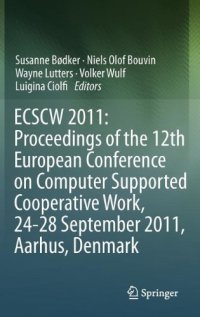
Ebook: ECSCW 2011: Proceedings of the 12th European Conference on Computer Supported Cooperative Work, 24-28 September 2011, Aarhus Denmark
- Tags: User Interfaces and Human Computer Interaction, Media Design, Management of Computing and Information Systems, Computer Appl. in Social and Behavioral Sciences
- Year: 2011
- Publisher: Springer-Verlag London
- Edition: 1
- Language: English
- pdf
This volume presents the proceedings of ECSCW 2011, the 12th European Conference on Computer Supported Cooperative Work. Each conference offers an occasion to critically review our research field, which has been multidisciplinary and committed to high scientific standards, both theoretical and methodological, from its beginning. The papers this year focus on work and the enterprise as well as on the challenges of involving citizens, patients, etc. into collaborative settings. The papers embrace new theories, and discuss known ones. They contribute to the discussions on the blurring boundaries between home and work and on the ways we think about and study work. They introduce recent and emergent technologies, and study known social and collaborative technologies, such as wikis and video messages. Classical settings in computer supported cooperative work, e.g. meetings and standardization are also looked upon anew. With contributions from all over the world, the papers in interesting ways help focus on the European perspective in our community.The 22 papers selected for this conference deal with and reflect the lively debate currently ongoing in our field of research.
This volume presents the proceedings of ECSCW 2011, the 12th European Conference on Computer Supported Cooperative Work. Each conference offers an occasion to critically review our research field, which has been multidisciplinary and committed to high scientific standards, both theoretical and methodological, from its beginning. The papers this year focus on work and the enterprise as well as on the challenges of involving citizens, patients, etc. into collaborative settings. The papers embrace new theories, and discuss known ones. They contribute to the discussions on the blurring boundaries between home and work and on the ways we think about and study work. They introduce recent and emergent technologies, and study known social and collaborative technologies, such as wikis and video messages. Classical settings in computer supported cooperative work, e.g. meetings and standardization are also looked upon anew. With contributions from all over the world, the papers in interesting ways help focus on the European perspective in our community. The 22 papers selected for this conference deal with and reflect the lively debate currently ongoing in our field of research.